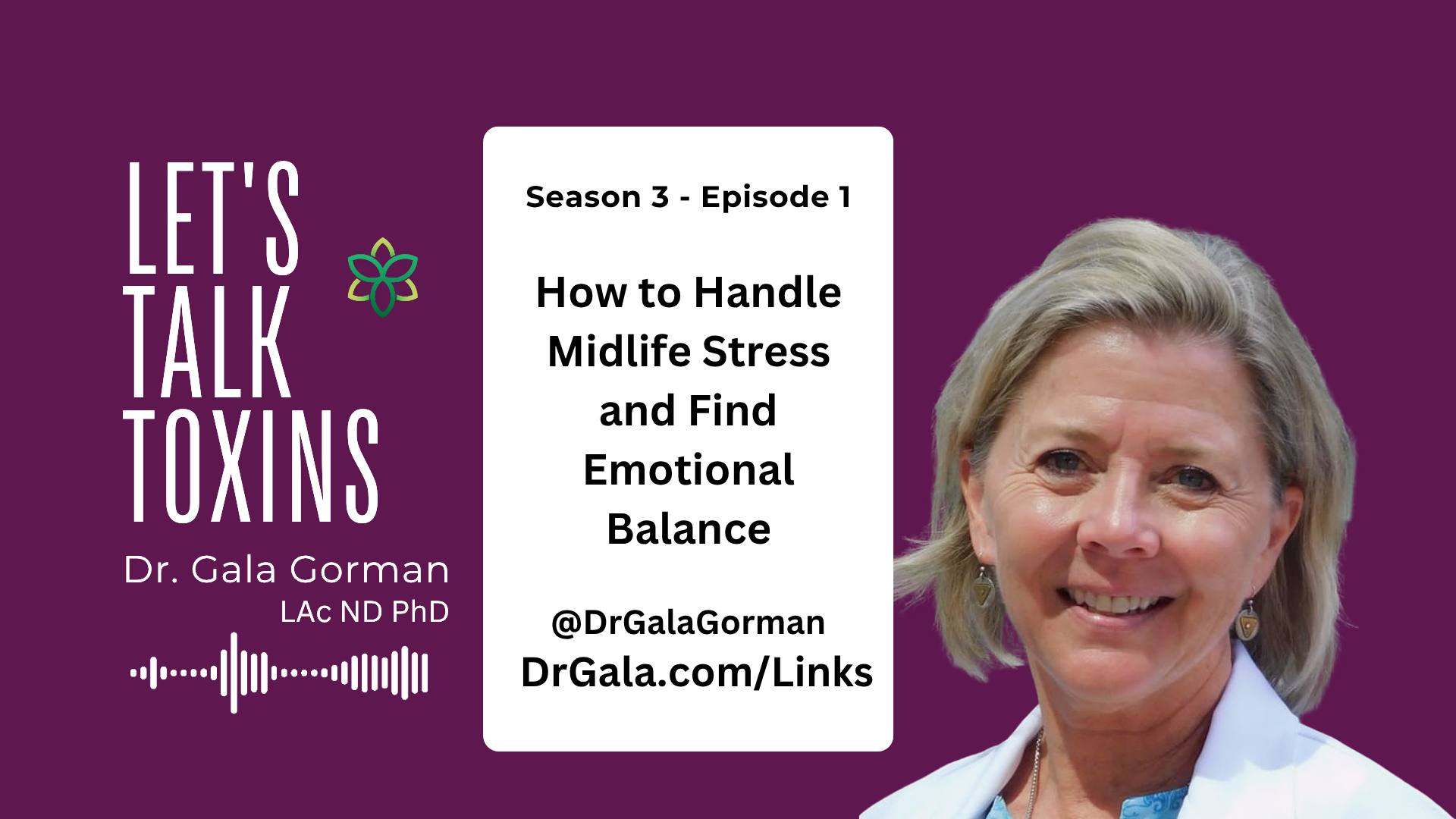NOTE: A machine generated this transcript. Please be aware that it may contain occasional errors in punctuation and spelling.
And when I poured my first little cup, I just poured a little bit of fresh, squeezed lemon juice in my cup to add the hot water, everything just exploded. Half a dozen lemons of juice went all over the kitchen floor. The housekeeper had just been here yesterday and everything was nice and spotless. And now I had a gigantic mess to clean up.
Welcome to the Let’s Talk Toxin Show. In this episode, we’re exploring a topic that hits close to home for many women: the hidden stressors of midlife and the anxiety that could come with aging. Are you feeling more restless, anxious, or dissatisfied as life’s priorities shift? New worries about health and independence may also be creeping in.
I’ll share the real signs of midlife stress, why aging anxiety happens, and provide some practical, uplifting strategies to help you develop resilience and find fulfillment in this next stage of life. And I’ll also answer your most pressing questions and offer expert tips for building a strong support network.
And if you’re new here, I’m Dr. Gala Gorman, a licensed acupuncturist, naturopath, and author of “What’s Your Kryptonite?” I wrote the book to help women understand the effects of chronic stress that’s turned toxic. In the book, I share the MOLT Method™ I developed to make it easy to shed stress along with the accumulated toxicity. Just like any other creature in nature that’s outgrown its trappings.
Many women find their way to me after trying everything to deal with their annoying symptoms. You may feel like you’ve learned more than you ever wanted to know about health and still aren’t healthy. It is time for a different approach. Symptoms are directly related to stress, but stress isn’t easy to master and it isn’t going away.
If you are ready for a new approach that will lead to stress mastery, I highly recommend my Wellness Warriors membership. It is perfect for those who have a strong sense they’re missing something important—that’s the key to optimal wellness. In the membership, we apply the MOLT method I developed. MOLT is an acronym: M is for mindset, O is for order, L is for lifestyle, and T is for toxins. It’s designed to help you shed stress, cruise through midlife symptom-free, and end issues such as chronic fatigue, insomnia, and weight gain. Join us and turn your knowledge into real change. You can learn more at DrGala.com/Links.
In this next segment, I share information from research studies related to toxicity. You can think of it as a toxin trend. The T in MOLT stands for toxins, and I can say with confidence that every symptom is caused by accumulated toxicity.
I evaluate 12 categories of toxicity when I’m working with someone to unravel a health mystery. Our world is full of manmade substances that our bodies were not designed to deal with. Coupled this toxicity with an overwhelming amount of toxic stressors the body was designed to manage—and it’s no wonder women find themselves playing whack-a-mole with symptoms.
I found a report that’s a great example of a toxin trend: chronic stress in midlife not only increases the likelihood of acute, stressful events later on but also contributes to depressive symptoms and poor physical health in both spouses. Wives’ midlife stress was found to directly affect their own and their husband’s later health, highlighting the interconnectedness of stress in couples.
These results emphasize the need for preventive interventions targeting chronic stress in midlife. Chronic midlife stress leads to more acute stress and health issues later on. And both mental and physical health are affected in both spouses. Spousal stress, as this is referred to, can have cross-partner health impacts. This is definitely an example of how stress turns toxic.
So if you’d like to get the toxins chapter, which is Chapter 12 from my book, “What’s Your Kryptonite?,” just know it’s dedicated to helping readers manage what I refer to as “Tricky Toxins,” which includes this emotional toxicity. Our bodies are bombarded with toxicity, so we have to learn to manage it. Just comment “tricky toxins,” and we’ll send you a link where you can download the chapter for free. If commenting isn’t convenient, go to DrGala.com/Links and sign up for my Wellness Weekly newsletter—you can respond to any email you receive from me with “tricky toxins,” and we’ll send you a link.
Now this next segment, I open the kimono to share how I was challenged to apply my suggestions. I’m Walking My Talk, and here’s an example. And just to let you know, every suggestion you’ll hear from me has been tested in the trenches. That includes saying no to symptom suppression.
Over the past four decades, I’ve developed processes that work sustainably. Typically, it requires a combination of approaches that I’ve synthesized to address the health issues that show up repeatedly for many women.
This story I’m gonna share actually comes from a several decades ago. In my mid-thirties, a client actually told my partner, at the time I was running the accounting firm, and he told my partner that I really did not look well and wondered if I was actually going to be around for a while. And I found that really odd because let me just tell you, this guy was not the picture of health himself. So, it kind of was the pot calling the kettle black, but even to be looked at in that same sort of lens really was disturbing for me.
It kind of kicked off a period in my life where I really seriously reconsidered everything. I actually ended up going to Brazil for a month, and when I came back, I changed my entire life, including leaving the accounting firm and really putting all of my attention towards health and well-being. Not just for myself, but to also help educate other women because this was not something that I was experiencing in a vacuum.
As I mentioned, this has been over 30 years ago, but what I learned is that I really didn’t have to change everything. All I really needed to do was change the 20% that was gonna produce 80% of the results. Some stressors are uniquely toxic for you, and so you’ve got to find your own way to reduce accumulated toxicity. And again, that is going to be something that you’re going to have to put together for yourself.
I do have some suggestions. I use extended fasting regularly. It’s something that really works for me. Most people, if they haven’t tried it, say, “Oh my gosh, I could never fast for an extended period of time.” But just trust me that once you build up your resilience and push it a little more, a little more, a little more, you will find yourself easily being able to do more extended fast. They’re not comfortable, and so it’s not something that you really want to put yourself in the position of needing to do regularly.
I do have another process I developed—it’s called the Human Energy System Reboot. I have 35 different ways—it’s essentially seven ways with five plays, and we practice these as we see fit essentially, together synergistically, and it really in just a week significantly helps to reduce the toxicity.
So these are just a couple of the things that I personally use to help keep my level of toxicity low so that I can really live active life, enjoy the things I love, and not have to put too many restrictions on myself on a day-to-day basis. The most important thing really is to just learn to master stress.
So let’s continue here and really discuss stress. This is a topic that’s at the heart of so many challenges we face during midlife. Stress isn’t just a feeling; it’s a powerful force that can affect our minds, bodies, and even our relationships.
We need to really learn what stress is, the different forms it takes and how it shows up in our daily lives so we can begin to take back control and build healthier, more resilient habits. So let’s break down the science of stress and discover how recognizing its signs is the first step toward lasting wellbeing.
Understanding stress is essential for maintaining both mental and physical health. Stress really arises from a variety of sources and affects individuals in different ways. For example, just this morning, I was squeezing some lemons to make a lemon juice jar that I was going to use for several days to make my warm lemon water that I used from time to time in the mornings.
And I was using a new device, basically to squeeze the lemons, and I didn’t screw the jar lid on tight enough. And, when I poured my first little cup, I just poured a little bit of fresh, squeezed lemon juice, in my cup to add the hot water, everything just exploded. Half a dozen lemons of juice went all over the kitchen floor. The housekeeper had just been here yesterday and everything was nice and spotless. And now I had a gigantic mess to clean up.
It also hit my favorite tea mug, and chipped that, and I had to throw that away. So I was super frustrated, and by the time I sat down to enjoy my morning time, which is just something that really soothes my soul, my system was racing and I was really honestly traumatized.
And so this is just an example of how something that’s a normal thing that happens in life can really fire up our stress. And if we are already stressed, you’re not sleeping well or something like that, that might have been enough to push me over the edge. Fortunately, I’ve been sleeping great. I didn’t have any big rush this morning, so after I managed to take a few deep breaths, I cleaned it up and carried on.
But, it’s just really important for us to manage our overall stress levels so that when situations like that happen, we have enough resilience and enough resources to be able to deal with it.
So recognizing the types of stress and their effects can help guide effective coping strategies. Stress is the body’s response to any demand or challenge. And it can be classified as eustress or positive stress that motivates, or distress—negative stress that overwhelms, and chronic or episodic stress, which is persistent or recurring stress that can really harm your health.
Stress triggers both physical and mental responses, including the release of stress hormones, increased heart rate, and emotional changes like anxiety or irritability. Stress also influences cognitive processes like decision-making. It can even impair judgment or problem-solving ability. This really highlights the importance of understanding and managing stress effectively.
Stress can have wide-ranging effects on the body, impacting both short-term and long-term health. These effects are not limited to just one system but can influence everything, from the heart and immune system to digestion and mental well-being. Recognizing the impact is key to understanding why managing stress is so important.
Stress activates the body’s fight-or-flight response, increasing heart rate and blood pressure. And over time, chronic stress can raise the risk of heart disease, stroke, and breathing difficulty. Stress also disrupts digestion, causing issues like heartburns, stomach pain, diarrhea, and constipation.
It could also even weaken the immune system, making the body more vulnerable to infections and even chronic illnesses. Chronic stress is linked to mood disorders like anxiety and depression. Cognitive difficulties like memory problems and even behavioral changes, which include irritability, social withdrawal, or unhealthy coping habits.
Managing anxiety involves adopting practical strategies to address fears and worries about growing older. Approaches range from lifestyle changes and social support to professional interventions. These are all aimed to improve emotional well-being and resilience.
Some of the healthy habits you might practice, mindfulness meditation, deep breathing, and yoga. I was really grateful that I actually had a yoga class already scheduled for this morning. And other regular physical activity. All of these help lower anxiety and promote a sense of calm and well-being.
Cognitive behavioral strategies—in the therapy world, it’s called CBT (which includes connecting with friends, family, or support groups)—can help reframe fears and reduce feelings of isolation. If you need to find some help, you wanna really look for a professional who specializes in this.
Consult a therapist who’s skilled in this kind of issue and can really help you develop stress management programs to significantly reduce this aging anxiety so that you can feel like you’re having a great experience in midlife.
And remember, you can get the “Tricky Toxins” chapter of my book “What’s Your Kryptonite?” for free. Just comment “tricky toxins,” and we’ll send you a link where you can download the chapter. If commenting isn’t convenient, go to DrGala.com/Links and sign up for my Wellness Weekly newsletter—you can respond to any email you receive from me with “tricky toxins,” and we’ll send you a link.
Now, let’s continue with a closer look at how stress actually affects our bodies and mind. Especially as we move through midlife, we’ll explore the surprising ways stress can show up physically and emotionally, and why it’s so important to recognize these signs early.
Plus, I’ll share some simple science-backed strategies you can start using today to manage stress more effectively. And don’t forget, if you have your own stress-busting tips or questions, leave them in the comments so we can support each other on this journey.
Coping with stress involves practical steps that can make daily challenges, feel more manageable. Simple lifestyle adjustments, relaxation techniques I’ve already mentioned, and positive thinking can all play a role in reducing stress and improving overall well-being. We already talked about techniques, meditation, and deep breathing and mindfulness. These techniques can quickly calm the mind and body. This helps to break the cycle of stress and anxiety.
It’s also really important to get regular exercise and eat a balanced diet because these support both physical and mental health. This increases your body’s resilience to stress and stabilizes your mood and energy levels.
Focus on active coping methods like problem-solving, seeking social support, and positive self-talk. These can help you avoid unhealthy habits like excessive alcohol or substance use—those are only gonna make matters worse. Chronic stress, when left unmanaged, can shift from being a temporary response to becoming toxic for the body and mind.
This toxic state is linked to a range of serious health concerns driven by persistent inflammation, hormonal imbalance, and changes in brain structure and function. It’s really important to get your hands around this chronic stress. It leads to abnormal levels of stress hormones and cytokines that cause inflammation. This can damage organs and tissues and is linked to diseases like cardiovascular disease, diabetes, cancer, autoimmune disorders—even depression.
Prolonged stress can cause physical changes in the brain, like reduced gray matter and neuronal atrophy, contributing to cognitive problems and increasing vulnerability to anxiety and depressive disorders.
Toxic stress is associated with a higher risk of heart disease, high blood pressure, stroke, metabolic disorders, and even premature death. This just highlights the importance of early intervention and stress management, or what I like to recommend, stress mastery.
In this next segment, I answer questions that have been submitted. The answers I give to questions I receive quite often apply to and would be helpful for most women. So, I accumulate a few related questions and then answer them in this segment for every episode. So, I refer to this segment as “Ask Away.” If you’d like to ask a question, I created a form so that it’s sure to get answered, and your question could be shared in a future episode helping many other women.
So comment “question,” and we’ll get you a link to the form. If commenting isn’t convenient, go to DrGala.com/Links and sign up for my Wellness Weekly newsletter. You can respond to any email you receive from me with “question,” and we’ll send you a link.
Why do I feel more anxious or worried now than when I was younger?
As women age, new life challenges and changes can make anxiety more common than in earlier years. Hormonal shifts or, leading into menopause, I like to say it’s kind of the straw that broke the camel’s back, if you’ve already been dealing with chronic stress, potentially even adrenal fatigue.
So these kinds of changes really increase our stress levels from the inside, and then typically that responds from the outside as well. There also might be increased responsibilities and concerns about health or the future, and these often contribute to feelings of just stress and anxiety, potentially.
These hormonal changes during menopause really affect mood and anxiety levels. Life transitions like children leaving home or retirement can also trigger new worries. Increased awareness of health and the results of aging can lead to more frequent anxious thoughts.
What can cause stress for women in midlife after 50?
Well, women in midlife face unique stressors that can impact their emotional and physical well-being. These might include changes in family dynamics, health concerns, and evolving personal roles. Caring for aging parents or supporting adult children can definitely create added pressure.
Health changes can include menopause as we’ve discussed, or chronic conditions, and this may be due to stress or caused by stress. It’s also possible that you’re adjusting to retirement or a shift in your personal identity, and all these things can be really challenging and create stress in your life.
How does stress show up in my body or emotions?
Stress can affect both the body and mind often in ways that are easy to overlook. Recognizing these signs can help women like you take steps to manage stress more effectively. Physical symptoms may include headaches, muscle tension, or trouble sleeping. Emotional signs might be things like irritability, sadness for unexplained reasons, or feeling overwhelmed. Difficulty concentrating or changes in appetite are also common indicators.
So that wraps up the questions I’m going to answer in this episode. Look for the Live Less Stressed Live, where I’ll answer additional questions related to this subject of understanding stress.
And remember, if you’d like me to answer your specific question, make sure to comment “Question,” and we’ll send you a link to the submission form. You’ll want to subscribe to the channel notifications to get regular updates. I regularly host an additional opportunity to get your questions answered in a podcast I call Live Less Stressed Live. Make sure you subscribe to the channel and activate the notifications so that you get a heads up from YouTube.
And that’s a wrap for this episode. This has been the Let’s Talk Toxin Show. Again, don’t forget to subscribe on YouTube and activate the notifications. You’ll get a reminder when I’m going live next. Until then—be well.












